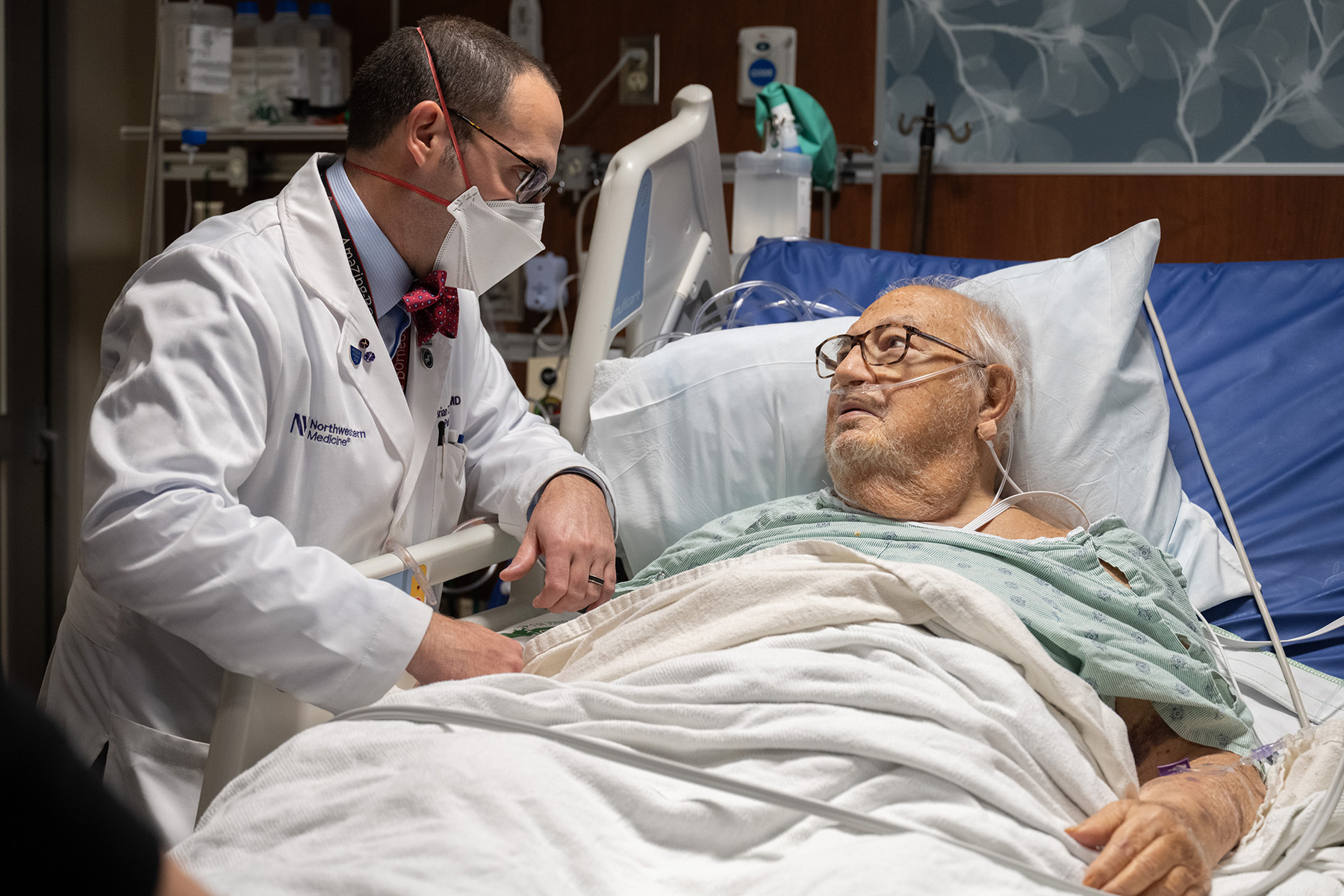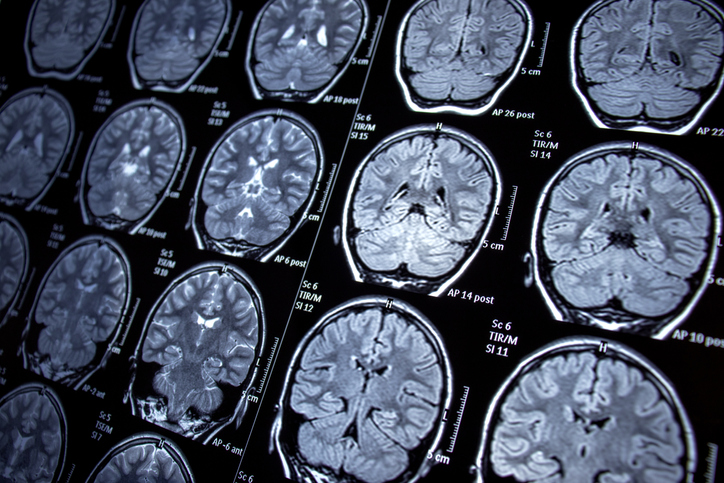Media Coverage
The work done by Northwestern University Feinberg School of Medicine faculty members (and even some students) is regularly highlighted in newspapers, online media outlets and more. Below you’ll find links to articles and videos of Feinberg in the news.
-
Crain’s Chicago Business
–
Making the case for better understanding of ‘arousal disorders’
In a new Northwestern Medicine study in the journal Sleep Medicine, researchers reviewed treatment on non-rapid-eye-movement disorders, like sleep apnea, insomnia and “arousal disorders” to find that sexsomnia, sleepwalking or sleeptalking and sleep terrors have few guidelines for treatment. Arousal disorders can involve things like sleep eating, engaging in sexual activity during sleep, walking, running or even driving while asleep and the intense fear of terrors, according to a Northwestern Medicine press release. However, unlike nearly every other type of sleep disorder, there are no consensus treatment guidelines for arousal disorders, Jennifer Mundt, PhD, led author of the study and assistant professor of neurology at Northwestern University’s Feinberg School of Medicine, said in the release. “These disorders can be dangerous and result in injuries to the sleeper or loved ones, so it’s important that symptoms are evaluated and treated,” Mundt said in the release. “And we need to have guidelines, so patients are getting the most effective treatment, which is not necessarily a medication.” Mundt found that the treatments with the most evidence about their effectiveness are cognitive behavioral therapy, hypnosis, sleep hygiene and scheduled awakenings, in which a sleeper is is woken up before they usually have an episode.
-
Chicago Tribune
–
With new Spanish-language pulmonary-thoracic program, Northwestern doctors hope to improve health outcomes for Hispanic patients
Growing up on the South Side of Chicago as the child of Mexican immigrants who primarily spoke Spanish, Dr. Daniel Meza was often asked to translate for his parents during medical appointments. “It’s a skill that I grew up with, having that technical language,” Meza said. “I just recall how stressful it was for my parents when they were in clinics, and as well as for myself, being a small child.” Two months ago, Meza, an assistant professor of medicine in pulmonary and critical care at Northwestern University Feinberg School of Medicine, became a part of the Northwestern Medicine Canning Thoracic Institute Hispanic Program. Patients of the program receive lung and thoracic care, including surgery and preventive screenings, entirely in Spanish. “When I see patients come in with their children and they see I speak Spanish, there’s kind of a relief on both sides,” Meza said. The program launched two months ago. It is led by Dr. Diego Mauricio Avella Patino, a thoracic surgeon trained in Colombia, and by Meza, both native Spanish speakers. Avella performs surgeries related to esophageal disease, lung failure, various cancers, chest wall issues and breathing obstruction. Meza specializes in treating pulmonary problems such as asthma, respiratory failure and emphysema.
-
Chicago Tribune
–
Teen’s death, his third encounter with gun violence in three years, shows persistent risks to survivors
Fifteen-year-old boy Swaysee Rankin, who died of a gunshot wound, had two other encounters with gun violence prior. It had been two years since someone in a moving car opened fire on him and a cousin as they walked toward home. It had been three years since he used his shirt to give first aid to a little girl who he witnessed being shot. Having been shot is itself a risk factor for becoming a victim of gun violence in the future, experts told the Tribune. The years 2018 and 2019 saw a total of 119 homicide victims under 17, according to professor Maryann Mason, PhD. Mason, associate professor of emergency medicine at Northwestern University, who runs a surveillance system tracking violent deaths, said 90 of those young people’s deaths were related to a firearm. And 21 of those victims had previously suffered a firearm injury. “Firearm violence is concentrated in certain subpopulations,” Mason said. “But for those populations, it’s sort of relentless.”
-
ABC News
–
COVID guide: What to know about symptoms, testing, treatment and vaccines
As COVID-19 cases and hospitalizations rise across the United States and a new updated vaccine becomes available, many have questions on how to best keep their families safe. Treatment is currently recommended for those are at higher risk of severe illness including those with underlying conditions, who are immunocompromised or who are young or aged 65 and older. “I think your run-of-the-mill young, healthy person who has symptoms, for the most part, will be able to, to weather the storm of COVID with just over-the-counter fever-reducing medicines, nasal congestion, and so on,” John Coleman, III, MD, a pulmonary and critical care specialist at Northwestern Medicine, told ABC News. There are three treatments commonly available. Paxlovid and Lagevrio (molnupiravir) are oral medications taken at home for five days while Veklury (remdesivir) is an intravenous mediation given a health facility for three days.
-
Yahoo! News
–
Does it help or hurt when celebrities open up about their menopause journey?
Menopause used to be a taboo topic that celebrities rarely spoke about. But lately, a slew of famous women have opened up about the life transition. Speaking publicly about menopause can also just raise awareness. But it can be tricky when celebrities — who aren’t doctors — offer medical advice, Dr. Lauren Streicher, a clinical professor of obstetrics and gynecology at Northwestern University Feinberg School of Medicine said. “On the one hand, people are paying attention since celebrities, of course, have far more credibility in our society than anyone,” she says. “People are finding it easier to talk about.” Further she shared, “But the problem is that they’re talking about it, making recommendations and selling products which are often bogus,” Streicher continues. “Those recommendations are not scientifically based, but people are latching onto what they’re selling and doing. The reason that all these celebrities are suddenly speaking out is because there is a lot of money to be made in menopause.”
-
Yahoo! News
–
The Common Dietary Habit That could Be Making Your Blood Pressure Worse
Every single person has the power to lower their blood pressure and LDL cholesterol through diet and lifestyle habits. In fact, there’s one diet habit in particular that cardiologists say is especially detrimental for blood pressure, and changing it could add years to your life. Donald Lloyd-Jones, MD, the Chair of the Department of Preventive Medicine at Northwestern University’s Feinberg School of Medicine and the past president of the American Heart Association, says that the dietary habit that negatively impacts blood pressure the most is regularly eating processed foods. “Foods that are cooked for us or are processed are usually much higher in sodium and also much higher in calories than something that was grown or produced and not processed,” he explains. Dr. Lloyd-Jones points out that the American Heart Association recommends no more than 2,300 mg of sodium a day (and an ideal limit of less than 1,500 mg per day) for most adults, especially for those with high blood pressure. If processed foods are a mainstay in your diet, you can reach this amount pretty quickly. For example, two slices of frozen pizza have about 724 mg of sodium. “Even cutting back by 1,000 mg a day can improve blood pressure and heart health,” Dr. Lloyd-Jones says.
-
NPR
–
The new COVID boosters are coming: Here’s what you need to know
If it feels like everyone you know has COVID, you’re not alone. Cases are on the rise, and so are hospitalizations and deaths. So the federal government’s release of new, updated COVID boosters feels like good timing. On Monday, the Food and Drug Administration approved the new shots; on Tuesday the Centers for Disease Control and Prevention weighed in with recommendations for who should get them. Short answer: Everyone ages six months and up. Along with older people, infants under 6 months – who are too young for the shots – had the highest rates of hospitalization from COVID, according to the CDC. So the best way to protect these youngest ones is to vaccinate those around them, says Tina Tan, MD
-
MSN online
–
With laxatives in high demand, doctors warn not to take them in excess or to lose weight
Amid high demand for laxatives, doctors are cautioning people not to overuse the products to take them for purposes other than constipation relief, such as weight loss. Over time, they said, more people have come to see constipation as an illness — especially now that more prescription treatments are available and advertised. The median age in the U.S. has also reached a record high (nearly 39 years), and people have become more sedentary, are eating less healthy diets and are taking more medications than ever, all of which can contribute to constipation. “The longer you live, the more illnesses you’re likely to get, the more medications you’re likely to take. So it all kind of compounds on itself,” said Darren Brenner, MD, a gastroenterologist at Northwestern Medicine.
-
Yahoo! News
–
The Common Mistake That Could Be Wreaking Havoc on Your Cholesterol, According to Cardiologists
According to a new survey conducted by Harris Poll and the American Heart Association, 70 percent of heart attack and stroke survivors had no idea that LDL cholesterol is commonly referred to as “bad cholesterol” because it contributes to the buildup of fat in the arteries. Donald Lloyd-Jones, MD, the Chair of the Department of Preventive Medicine at Northwestern University’s Feinberg School of Medicine and the past president of the American Heart Association, says that many people have a mix of genes that make them more prone to absorb cholesterol and saturated fats from their diet. This makes them more at risk of having high cholesterol. “Blood levels of LDL-cholesterol are a major causal risk factor for cardiovascular disease,” Dr. Lloyd-Jones says. The problem, he says, is that many people don’t realize their risk. This is exactly why Dr. Lloyd-Jones says that it’s important to know what your cholesterol numbers are and find out if you are sensitive to dietary cholesterol. He says that not working with a doctor to find out one’s cholesterol numbers and risk is the number one mistake people make when it comes to managing cholesterol.
-
New York Times
–
Fall Allergies Are Real. And They’re Getting Worse.
Allergies don’t only crop up in the spring. The persistent sniffles, clogged nose, itchy eyes and sneezing also happen in the fall — and, experts say, they’re getting more common, and more intense. Symptoms can vary from person to person, but many people will exhibit the same signs of allergies in the fall as they do in the spring, said Anju Peters, MD, an allergist at Northwestern Medicine. That means runny noses, sneezing, stuffiness, postnasal drip and fatigue — symptoms that sound a whole lot like colds and Covid. The only way to be completely sure you don’t have Covid is to take a test — but there are a few clues to help pin down the source of your sniffles. Viral infections tend to develop suddenly, and then run their course, Dr. Parikh said, while allergies slog on for four or six or eight weeks at a time. And allergies — unlike colds, Covid and the flu — don’t usually cause fevers, body aches or gastrointestinal symptoms like diarrhea, she said. Itchiness can be a telltale sign that you’re dealing with allergies, so watch out for scratchy, tingling ears, eyes, throats and noses, she added. Fall allergens can also cause rashes like eczema.






